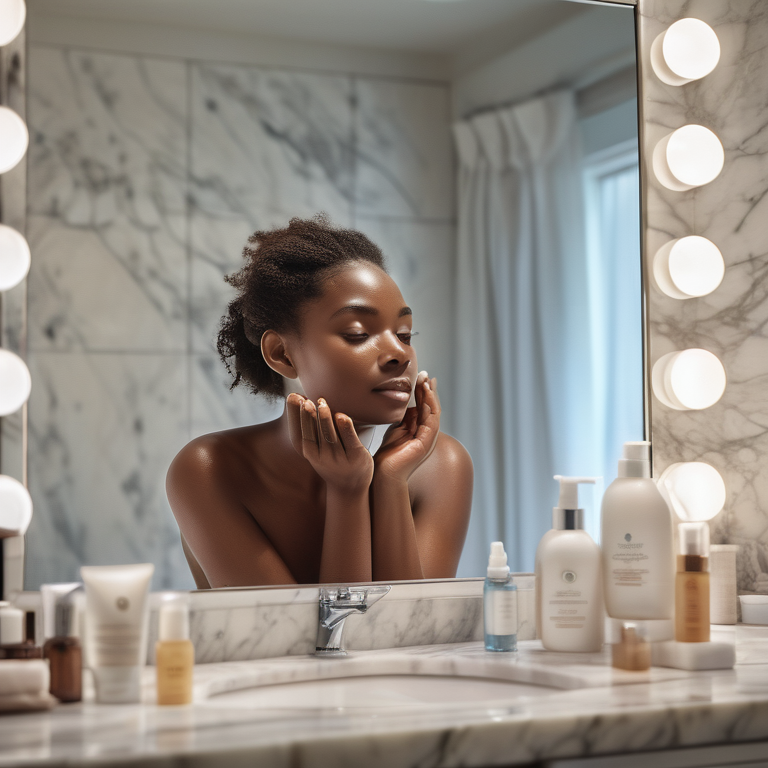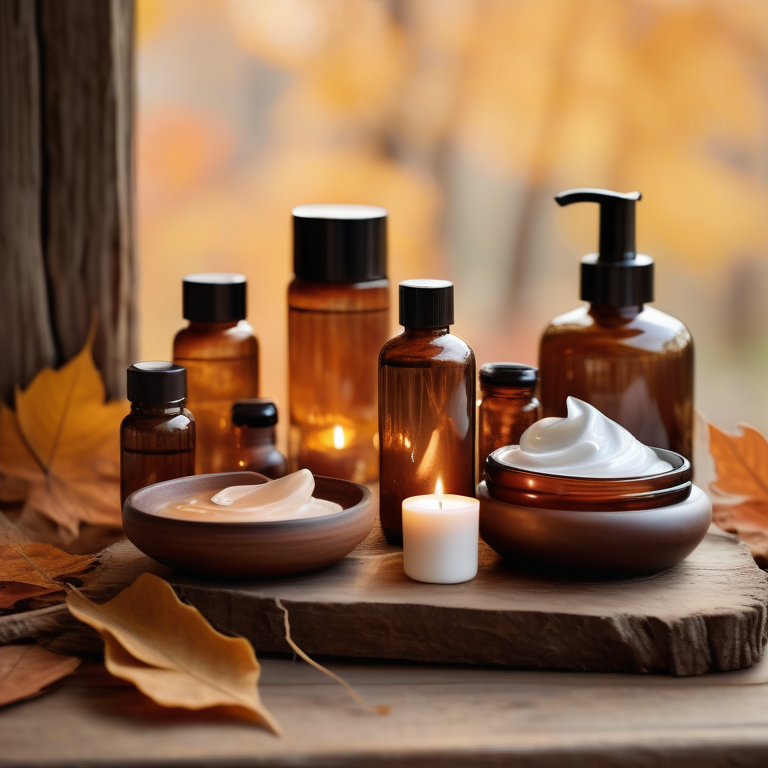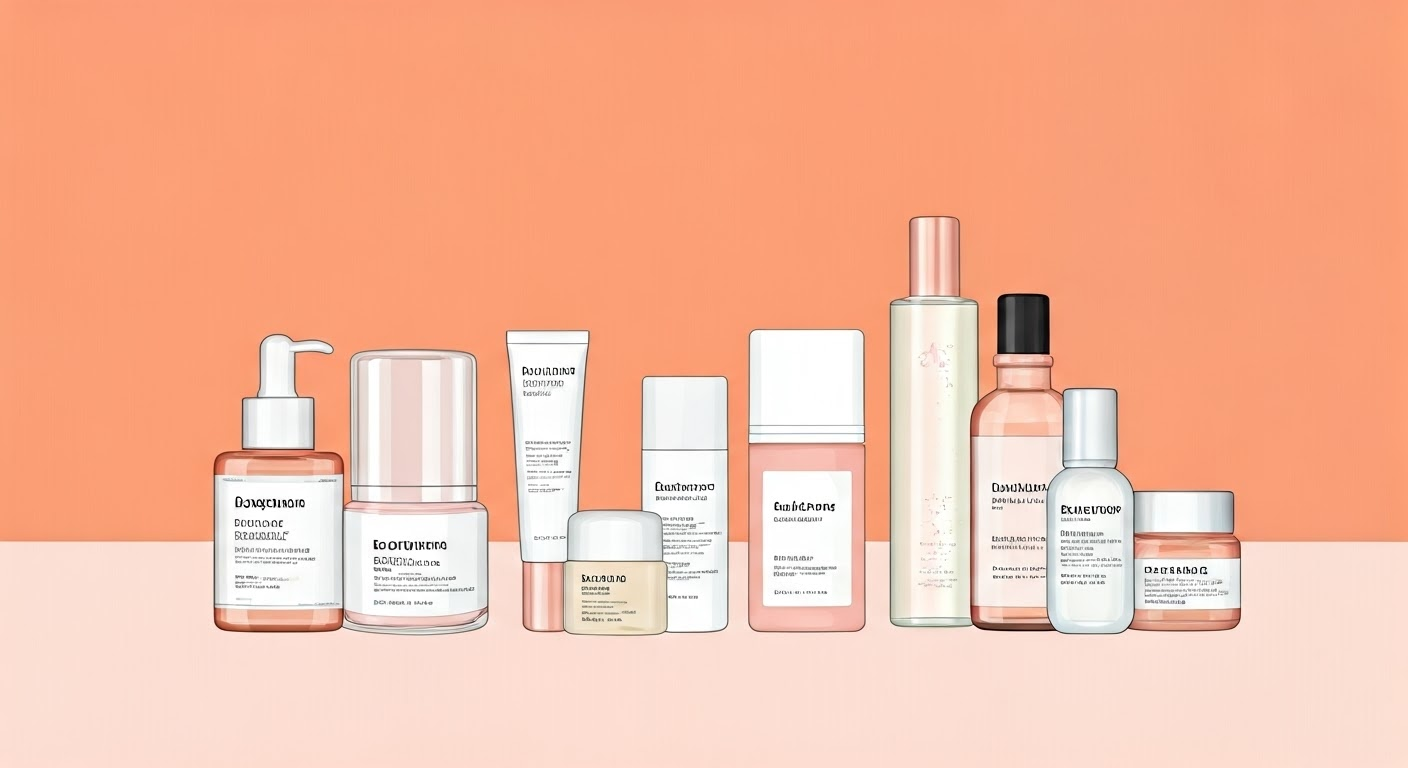The Importance of a Skin Care Routine


Key Highlights
A proper skin care routine is essential for maintaining not only a radiant appearance but also overall health and well-being.
- The skin, being the largest organ, acts as a protective barrier against external aggressors, regulates body temperature, and promotes vitamin D synthesis.
- Different skin types have unique needs, and understanding your skin type is crucial for establishing an effective skin care routine.
- Customizing your routine based on factors like skin type, weather changes, and the incorporation of anti-aging products is essential for optimal results.
Diet and lifestyle choices play a significant role in skin health, and adopting a holistic approach is crucial for achieving radiant skin.
Introduction
A good skin care routine is very important for keeping your skin healthy. It does more than just help your skin look nice. It is also key to protecting your overall health and well-being. In this blog post, we will talk about why a skin care routine is important for healthy skin and how it can improve your overall health. We will guide you through the basic ideas of skin care. This will help you make smart choices for a lifetime of good skin and a glowing complexion.
Understanding the Basics of Skin Care
Taking care of your skin is very important for a healthy and glowing look. First, you need to know your skin type. This will help you meet your skin's specific needs. Whether your skin is dry, oily, sensitive, or a mix, you should adjust your routine.
Also, be careful about common skin care mistakes. These mistakes can hurt your skin. They include not using sunscreen and over-exfoliating. Knowing how to avoid these mistakes is very important.
The Role of the Skin in Overall Health
The skin is the largest organ in the body, and it is very important for our health. It does more than just look good. It protects us from outside dangers and helps fight off harmful things in our environment. Keeping our skin healthy is key for our body to work well.
The skin is our first defense. It keeps our internal organs safe from bad bacteria, UV radiation, and pollution. It also helps control our body temperature, so we don’t get too hot. When our skin gets sunlight, it makes vitamin D. This vitamin is essential for healthy bones, a strong immune system, and overall well-being.
If we don’t take care of our skin, it can become weak. This makes us more likely to get skin infections, skin conditions, and other health problems. Knowing how important our skin is reminds us to take good care of it for better overall health.
Different Skin Types and Their Needs
Each person has a different skin type. It is important to meet the specific needs of your skin for good skin care.
Dry skin needs moisture. It works best with rich and hydrating creams that restore and keep in hydration. You may notice dry skin feels tight or flaky.
Oily skin produces too much oil, making the skin shiny with bigger pores. This type of skin can get acne and breakouts. It needs products that control oil and do not block pores. These products keep skin moist without removing necessary oil.
Sensitive skin is easily irritated. It can turn red, itch, and feel uncomfortable. So, it needs gentle and fragrance-free products. These choices help avoid reactions and keep the skin balanced.
Knowing your skin type is key to building a good skin care routine. This helps meet your skin's needs and fosters a healthy look.
Preparing for a Skin Care Routine
Starting a skin care journey means you need the right tools and knowledge. To get ready for your skin care routine, choose products that are good for your skin type and its issues. Looking into and investing in quality ingredients is important for getting the best results.
It is also crucial to know the right order to use these products. Learn the steps from cleansing to moisturizing. This way, you can make the most of each product and keep your skin safe.
Essential Tools and Products for Beginners
Starting a skin care routine is easy. If you are a beginner, just a few key products can help your skin stay healthy. First, a gentle cleanser is very important. It removes dirt and extra oil without taking away your skin's natural oils.
Next, use a toner. It helps balance your skin's pH level. This prepares your skin to absorb other products better. A moisturizer is also necessary. It hydrates your skin and strengthens its protective layer. Choose a moisturizer that matches your skin type. If you have oily skin, go for a lightweight option. If you have dry skin, pick a thicker cream.
Remember, consistency matters. Using these basic products every day, in the morning and at night, can help improve the health and look of your skin over time.
How to Identify Quality Skin Care Products
Navigating skin care products can be tough. There are so many options that promise great results. But finding quality skin care products is very important for an effective skincare routine. Start by looking closely at product labels. Pay attention to the list of ingredients.
Choose products that do not have harsh chemicals, artificial fragrances, and things that might irritate your skin. Focus on ingredients that help, like hyaluronic acid for hydration, vitamin C for brightening skin, and retinol for anti-aging. Also, think about the brand's reputation. Look for products that have good reviews and scientific support.
Keep in mind that just because a product is expensive, it doesn’t mean it’s better. You need to find what works best for your skin type and any concerns you may have. Don’t hesitate to try different products and talk to a dermatologist if you need advice.
Step-by-Step Guide to Establishing Your Routine
Creating a regular skin care routine is important for healthy skin. Start by figuring out your skin type. Then, choose products that meet its needs. Once you have the right products, spend a few minutes each morning and night on your routine.
Sticking to your routine is essential. Stay patient and consistent, and your skin will benefit over time. A good skin care routine, paired with a healthy lifestyle, will help give you a glowing complexion for many years.
Step 1: Cleansing - The Foundation of Healthy Skin
Cleansing is the first and most important step in any good skin care routine. It helps remove dirt, impurities, and dead skin cells that build up during the day. This step allows other products to go deep into the skin and work effectively. Use lukewarm water when cleansing. Hot water can take away natural oils, making your skin dry and irritated.
Gently massage the cleanser onto your skin in circular motions. This helps lift away impurities without hard scrubbing, which can hurt your skin. Pick a cleanser that is right for your skin type. For example, if you have oily or acne-prone skin, look for cleansers with salicylic acid. If you have dry or sensitive skin, choose gentle, hydrating cleansers.
Make sure to rinse off all the cleanser completely. Leaving any residue can clog pores and stop other products from working well. Cleansing should be a must in your daily routine. Do it both in the morning and at night to keep your skin clean and healthy for your skin care products.
Step 2: Toning - Balancing the Skin's pH
After you cleanse your skin, using a toner can greatly improve how your skin looks and feels. Toners help to bring back the skin's natural pH balance, which often gets messed up during cleansing. Keeping this balance is important because it helps the skin protect itself, keeps moisture locked in, and reduces the chances of irritation and breakouts.
Toners can also have other benefits based on what they contain. Some have ingredients like witch hazel that tightens pores and controls oil. Others, like those made with rose water, can soothe and hydrate, making them a good choice for sensitive skin.
To use a toner, soak a cotton pad in it and gently wipe it over your face while avoiding your eyes. Let the toner dry completely before you continue with the next step in your skin care routine.
Step 3: Moisturizing - Hydrating and Protecting the Skin
Moisturizing is a must in every skincare routine, no matter your skin type. It helps restore the skin's natural oils that cleansing and outside factors might remove. A good moisturizer builds a protective layer on the skin. This locks in moisture and helps avoid dryness, flakiness, and irritation.
Moisturizing also keeps the skin elastic and supports a fresh, youthful look. When the skin has enough hydration, it can fight off the harm from free radicals that lead to premature aging. Look for moisturizers that have antioxidants like vitamin E and green tea extract for extra protection.
Apply your moisturizer to damp skin after you cleanse and tone. This helps it absorb better. Gently rub it in with upward circular movements to spread it evenly. Pick a moisturizer that matches your skin type. Choose light, oil-free products if you have oily skin and richer creams for dry or mature skin.
Step 4: Applying Sunscreen - The Ultimate Protection
Sunscreen is an important part of any skin care routine. It offers vital protection from the sun's harmful rays. UV radiation, especially from UVB rays, can lead to premature aging, sunburns, and a higher chance of skin cancer. You should use sunscreen every day, no matter the weather, because UV rays can get through clouds and affect us indoors.
When you choose a sunscreen, look for a broad-spectrum type that protects against both UVA and UVB rays. Pick a sunscreen with an SPF of 30 or more for good protection. If you'll be swimming or sweating, make sure it is water-resistant. Apply sunscreen generously on all skin that is exposed, including your face, neck, ears, and hands.
Make it a habit to apply sunscreen every day, even if it's cloudy. This helps protect your skin from UV radiation damage. Adding this step to your routine can significantly lower the risk of sun damage and keep your complexion youthful and glowing for many years.
Customizing Your Skin Care Routine
A basic skin care routine is a good start. However, making it fit your personal needs is very important for the best results. Things like your skin type, lifestyle, and the environment can change how your skin acts. This means you may need to change your routine.
For example, if you have oily skin, you might want to add clay masks or salicylic acid treatments. If you have dry skin, hydrating serums and overnight masks may help. Don’t be afraid to try new things. Pay attention to how your skin feels and change your routine when you need to.
Adjusting Your Routine for Different Skin Types
Each skin type is different and needs special attention. It is important to change your skin care routine to meet these needs. This will help you get a healthy and glowing complexion.
For oily skin, you should use light, oil-free products that keep your skin from producing too much oil without blocking your pores. Dry skin needs hydration. Rich, thick creams work well because they add and keep in moisture.
If you have sensitive skin, you need gentle and fragrance-free products to reduce the chance of irritation. Always think about your skin type when choosing products and adjust your routine to fit.
If you are not sure about your skin type or how to change your routine, ask a dermatologist. A skin expert can give you helpful advice based on what your skin needs.
Seasonal Skin Care: Adapting to Weather Changes
Just like we change our clothes with the seasons, we should change our skincare routines too. Adapting to the weather is very important for keeping our skin healthy. In winter, cold air and indoor heating can dry out our skin. That's why a thick, hydrating moisturizer is the best choice to protect your skin.
In the summer, it’s better to use lightweight, oil-free products. These won't block your pores when the weather is hot and sticky. Don’t forget that sun protection is important all year, as UV damage can happen even on cloudy days. Always put on sunscreen with an SPF of 30 or higher before going outside, even in winter.
By changing your skincare routine with the seasons, you give your skin the care it needs. This helps your skin stay healthy and glowing all year long.
Incorporating Anti-Aging Products and Antioxidants
As we get older, our skin goes through changes. These changes can cause visible signs of aging. You might notice fine lines, wrinkles, and age spots. Using anti-aging products and antioxidants in your skin care routine can help reduce these signs. Antioxidants like vitamin C, vitamin E, and green tea extract can help protect your skin. They neutralize free radicals, which are unstable molecules that harm skin cells and speed up aging.
Retinoids come from vitamin A and are known for their strong anti-aging benefits. They help your skin produce collagen, which can make wrinkles and fine lines less visible. They also improve your skin's texture and tone. It’s important to start with a low amount of retinol. Then, you can slowly use it more often to prevent irritation.
Using these ingredients with a good diet, enough sleep, and managing stress can really help improve the long-term health and look of your skin.
Advanced Skin Care Practices
After you set up a good skincare routine, you may want to try some advanced methods to improve your skin. These methods can include using special treatments like serums, masks, and exfoliation techniques.
These practices can be helpful, but you need to think about them carefully. Sometimes, it's best to talk to a dermatologist before starting. Knowing the benefits and risks of each method is important. This helps you avoid any bad reactions and get the results you want.
The Benefits and Risks of Exfoliation
Exfoliation is the act of removing dead skin cells from your skin. When you add it to your skincare routine, it can offer many benefits. It makes your complexion brighter and smoother. It also helps keep your pores clear and allows your other skincare products to work better. Regular exfoliation can make fine lines, wrinkles, and dark spots less noticeable.
But be careful! Doing too much exfoliation can cause skin irritation, dryness, and breakouts. If you have sensitive skin, you should choose gentle ways to exfoliate. For example, you can use a soft washcloth or a chemical exfoliant that has a low level of acids.
Always use a moisturizer after you exfoliate. This helps keep your skin's moisture and protects it from outside stressors. Pay attention to how your skin feels and change how often and how hard you exfoliate when needed.
When and How to Use Serums and Masks

Serums and masks are special treatments that help with specific skin care issues. They can be great to add to your daily routine. Serums are light and focused. They go deep into your skin and deliver strong ingredients to help with problems like fine lines, dry skin, or dark spots. You should put a few drops of serum on clean, dry skin before you use a moisturizer.
Masks, on the other hand, give a more intense treatment. They provide a strong dose of helpful ingredients. Masks come in many types, like sheet masks or clay masks. Each one is made for different skin issues. You should spread a thin layer of the mask on clean, dry skin and stay away from your eyes. Leave it on for the time it suggests, then rinse it off.
Start using serums and masks slowly in your routine. Try using them once or twice a week at first. Then, you can increase how often you use them if your skin feels okay. Watch how your skin reacts to these treatments and change your use if needed.
Eye Care: Preventing Wrinkles and Dark Circles

The skin around our eyes is thin and can show signs of aging easily. This includes fine lines, wrinkles, and dark circles. Using a special eye cream in your skincare routine can help with these issues and keep your appearance youthful.
Find eye creams that have ingredients made for specific problems. For example, retinol can reduce fine lines and wrinkles. Caffeine can help with puffiness and dark circles. When using eye cream, tap a small amount gently with your ring finger on the bone around your eye. Do not let it touch the very sensitive skin.
Also, prevention is important. Wearing sunglasses can protect your eyes from sun damage. Getting enough sleep can also help prevent premature aging around your eyes.
The Impact of Diet and Lifestyle on Skin Health
Having a good skincare routine is very important. But, we also need to remember that skin health is not just about creams and lotions. What we eat and how we live matter too. Eating a balanced diet full of fruits, vegetables, and healthy fats helps our skin stay healthy from the inside.
Things like stress, not getting enough sleep, and not drinking enough water can hurt our skin. So, it is important to manage stress well, sleep seven to nine hours at night, and drink plenty of water. This will help us keep a nice complexion.
Foods That Promote Radiant Skin

To get healthy and glowing skin, having a good diet is just as important as your skincare routine. Eating foods full of nutrients gives your body what it needs to keep your skin healthy. It fights damage from free radicals and helps you look youthful.
Here are some foods that are great for your skin:
- Fatty Fish: Salmon, mackerel, and sardines are full of omega-3 fatty acids. These help keep your skin full and hydrated.
- Avocado: This smooth fruit has healthy fats and vitamins E and C, which help keep your skin moist and protect it from damage.
- Berries: Blueberries, strawberries, and raspberries are rich in antioxidants. They help shield your skin from outside harm and slow down aging.
- Nuts and Seeds: Almonds, walnuts, and chia seeds are full of healthy fats, vitamin E, and zinc. These help your skin stay healthy and repair itself.
By choosing your foods carefully and focusing on a balanced diet, you can feed your skin from the inside. This will boost your skincare routine and help you get a glowing complexion.
Habits to Adopt for a Healthy Skin Lifestyle

A healthy lifestyle is very important for keeping your skin healthy and vibrant. Along with a good diet, adding simple habits to your daily life can really help your skin's look and health. Getting enough sleep helps your skin repair itself. Regular exercise can boost blood flow, bringing nutrients to skin cells.
Managing stress is key too. Techniques like meditation or spending time outside can help lower cortisol levels. High cortisol can lead to skin problems like acne and premature aging. It’s also important to avoid smoking and drink less alcohol. These habits can dry out your skin and speed up aging.
Taking good care of your skin needs a full approach. You should use effective treatments and make healthy life choices. When you focus on your overall well-being, you can enjoy bright and youthful skin for many years.
Conclusion
Creating a regular skin care routine is very important. It helps keep your skin healthy and glowing. First, you need to know your skin type. Then, pick good quality products. Make sure to follow a simple routine that includes cleansing, toning, moisturizing, and sun protection. This will help your skin's health.
You should also change your routine as the seasons change. Adding things like exfoliation and serums can make your skin care routine even better. Don't forget that your diet and lifestyle matter too. Eating healthy foods that are good for your skin can make a big difference.
So, start taking care of your skin every day. A good skin care routine will make your skin look bright and healthy!
Frequently Asked Questions
Why is a Skin Care Routine Important?
Having a skin care routine is important because it helps maintain skin health, prevent premature aging, and address specific skin concerns like acne or dryness. Consistent care with suitable products can enhance skin appearance, boost confidence, and contribute to overall well-being and self-care.
How Often Should I Change My Skin Care Products?
The need to change your products depends on your skin type, skin conditions, and the products you use. In general, you should switch products if you see any bad reactions. If you have sensitive skin, you might need to change products more often. On the other hand, if your skin has fewer issues, you can usually keep an effective skincare routine for a longer time.
Can Diet Really Affect My Skin?
A good diet really impacts skin health. Eating a balanced diet filled with antioxidants, healthy fats, and important nutrients can help protect your skin from free radicals. This kind of diet also helps promote collagen production and supports the skin's natural oils. As a result, you can achieve a healthier and more radiant complexion.




